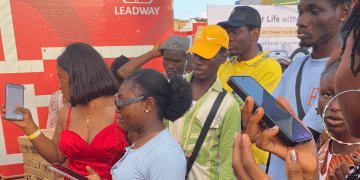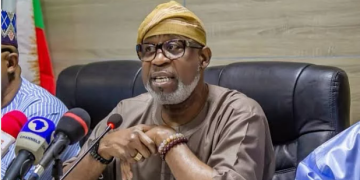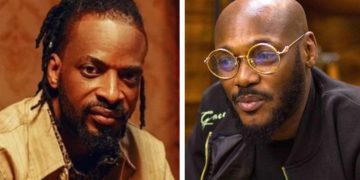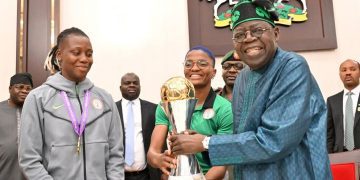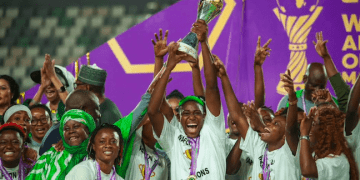By Jane Okafor, Abuja
A former Attorney-General of the Federation, Kanu Agabi, who is the lead counsel to the detained leader of the proscribed Indigenous People of Biafra(IPOB), Nnamdi Kanu, has applied to withdraw his representation in the ongoing terrorism trial of the embattled separatist agitator before the Federal High Court in Abuja.
Aloy Ajimakor, one of the lead counsel was reminded in Kuje Prison on Tuesday along with 11 others, including Kanu’s brother – Prince Emmanuel Kanu – on the order of Kuje Magistrate Cout over #FreeNnamdiKanuNow protest in Abuja on Monday.
The detained Nnamdi Kanu is standing trial on a seven-count charge bordering on terrorism, filed against him by the Federal Government.
Agabi announced withdrawal of representation on Thursday when the matter was mentioned before the trial judge, Justice Kolawole James Omotosho.
Agabi informed the court that he would no longer be representing the IPOB leader, adding that the defendant had elected to take back the case from them.
Similarly, all the Senior Advocates of Nigeria involved in the matter case also announced their withdrawal from the case, a development was confirmed in Court by the IPOB leader.
Kanu told the court that he would be representing himself henceforth, hinting a the changing stance on representation later.
When the trial judge, Justice James Omotosho, asked if he should assign a lawyer to represent him, but the Kanu declined the offer.
But addressing the court orally, Kanu argued that the court lacked jurisdiction to try him.
The Daily Crucible reports that Justice Omotosho, on October 16, granted the defendant six consecutive days, beginning from October 23, to open and close his defence in view of the accelerated hearing earlier granted in the case.
Meanwhile, Nnamdi Kanu in a stunning dimension has filed a motion naming former Attorney-General of the Federation (AGF), Abubakar Malami, and other prominent political and security personalities as his witnesses in the terrorism trial.
Kanu’s motion, filed on October 21 and marked FHC/ABJ/CR/383/2015, was addressed to Justice James Omotosho of the Federal High Court in Abuja.
He personally signed the document, stating that the application was in compliance with the court’s order of October 16, which directed him to open his defence on October 24.
In the motion entitled ‘Notice of Number and Names of Witnesses to be Called by the Defendant’, Kanu seeks to call 23 witnesses, including international experts, state governors, military generals and former intelligence officials. He divided the witnesses into two categories: voluntary but material witnesses and vital compellable witnesses to be subpoenaed under Section 232 of the Evidence Act, 2011.
Among the voluntary witnesses is Emeka Umeagbalasi, a political historian, who will testify on the legal foundations of self-determination and state violence against members of IPOB. Another unnamed forensic linguist will analyse Kanu’s public broadcasts to counter claims that they incited violence or terrorism.
Also listed is Benjamin Madubugwu, a former co-accused, who will testify on the non-violent structure and goals of IPOB. Dan Ulasi, a community leader from Abia State, is expected to testify that Kanu’s broadcasts were viewed locally as political commentary, not hate speech, while an unnamed security expert will address procedural flaws and investigative irregularities in the terrorism case.
United States (U.S.) lawyer, Bruce Fein, will testify on the illegality of Kanu’s extraordinary rendition from Kenya and its implications for trial jurisdiction, while Kanu’s personal physician, Prof. Martin Aghaji, is expected to testify on the effect of his prolonged detention on his physical and mental health.
Digital expert, Barry Sutton, from the Massachusetts Institute of Technology (MIT), will analyse the authenticity and chain of custody of digital evidence submitted by the prosecution.
Kanu’s brother, Emmanuel, is listed to provide witness testimony on the 2017 military raid on their Abia home. Kanu himself will testify in his own defence, denying the allegations and placing his statements within a political and legal context.
In the second category of witnesses, Kanu is requesting the court to subpoena Malami to testify on the legal basis of his abduction from Kenya in 2021. He is also seeking the testimony of former Director-General of the National Intelligence Agency (NIA), Ahmed Abubakar, on the diplomatic and operational coordination of that rendition.
Former Director-General of the Department of State Services (DSS), Yusuf Bichi, is listed to speak on custody conditions and the agency’s role in the operation. An unnamed DSS officer directly involved in the rendition will be cross-examined on alleged fabrication of statements and custodial abuse.
Former Chief of Army Staff (COAS), Lt-Gen Tukur Buratai (rtd), is expected to testify on the chain of command during the 2017 military invasion of Kanu’s home, while Minister of Works and former Governor of Ebonyi State, Dave Umahi, will testify on the controversial proscription of IPOB by the South-East Governors Forum (SEGF).
Former governor of Abia State, Okezie Ikpeazu, will testify on his administration’s role during the military operation in Umuahia, and Governor Hope Uzodimma of Imo State will clarify public statements he made following the assassination of Ahmed Gulak.
Federal Capital Territory (FCT) Minister, Nyesom Wike, who governed Rivers State during the 2020 Obigbo crisis, is to testify on the military crackdown that followed the #EndSARS protests, while Governor Babajide Sanwo-Olu of Lagos State will testify on the findings of the Lagos #EndSARS Judicial Panel, particularly the Lekki Toll Gate incident.
Former Defence Minister, Gen Theophilus Danjuma (rtd), is listed to speak on his 2018 statement warning Nigerians to defend themselves against state-backed violence.
Kanu’s motion posits that these testimonies are essential to ensuring a fair trial and to “manifestly” demonstrate that justice is being done before the Nigerian public.
He subsequently asked the court to extend the defence timeline by 90 days to accommodate the number and importance of witnesses.
… additional report: credit The Guardian.

